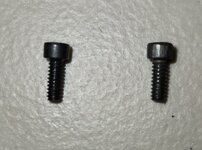Jpsmith1
Lil-Rokslider
I just had a properly torqued base come loose without loctite.
Fortunately, I caught it before thread damage was done and the gun needed Smith work.
I won't install without loctite and proper torque
Fortunately, I caught it before thread damage was done and the gun needed Smith work.
I won't install without loctite and proper torque



